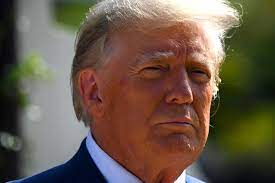Emma Brockes
It seems a long time ago, but there was a brief period, after Joe Biden’s inauguration and before the 6 January hearings and the start of campaigning for next year’s presidential election, when it was possible to avoid Donald Trump for days at a time. He was still there, obviously, wandering the corridors at Mar-a-Lago, Gloria Swanson-style, and posting screeds to Truth Social. But there was no real reason to think about him and, for that short period, he was returned to his essential state: just another person posting unhinged rants online.
This is not where Trump is now – in the US, at least. Thanks to a raft of legal actions, culminating earlier this month in the justice department’s arraignment of the former president for allegedly trying to overturn the 2020 election result, Trump is not only front and centre every day, but in danger of ascending to a new position in the news cycle: political martyr and victim of a witch-hunt. Given the preposterousness of the events leading up to this moment – only recently, a jury found Trump liable for defamation and sexual abuse – it seems inevitable we should find ourselves here.
Trump, of course, is keenly aware of the potential in his superficially dire situation and has already leaned fully into it. In campaign stops across the US, and with the threat of jail hanging over him, he is doing the thing we know from experience to be the man’s absolute forte: siphoning the heat and energy from any given charge against him and refracting it back on his enemies. “They want to silence me because I will never let them silence you,” he told a crowd in New Hampshire on Tuesday. As the New York Times pointed out this week, his new campaign message for the 2024 election is: “I’m being indicted for you”. (A woman at the New Hampshire event told the reporter, nonsensically but with heart: “What, am I next?”) It is an exceedingly weird and insoluble problem. From experience we know that the only blows that land on Trump are either ridicule – recall his face when Obama mocked him, all those years ago, during the White House correspondents’ dinner – or ignoring him. Of the two, only the latter really promises results. In the shocked days after Trump’s election in 2016, I recall that Obama’s moment of mockery was singled out as an example of precisely the kind of leftwing self-indulgence that dislodged the first pebble in Trump’s psychology, and ended in his run for the White House. It is a mistake to take the man seriously; indicting him on four criminal counts of allegedly attempting to overturn a democratic election is the very definition of taking someone seriously. And yet, in a functioning democracy, how on earth might one let this pass?
As such, the unfolding of the latest and most serious legal action against Trump highlights a stark divide between the political and judicial rationales for pursuing him. As has already been observed, Trump is on exceedingly thin ice with Moxila A Upadhyaya, the judge who set the terms of his conditions for release pending trial. In the last week, Trump posted what might be construed as vague threats in the direction of any prospective juror (“If you go after me, I’m coming after you!”), raising the possibility of a scenario in which he is yanked to jail and campaigns for the presidency from his cell. There is, in the current climate in the US, nothing pleasing about this image. In fact, with every passing day, and with a perversity no amount of exposure to Trump can ever quite normalise, Trump in jail seems like the worst possible outcome. Campaigning from a prison cell would lend Trump a righteousness exceeding even his present grandiose narrative, and widen the sweep of his supporters by offering them a wildly romantic and dramatic cause to join.
What remains so hard to grapple with is that in spite of the deadly seriousness of the events that got us here – it is easy to forget, sometimes, that people died on 6 January – as ever with Trump, one senses the wink behind every gesture. When he tells supporters, as he did in March, “I am your retribution”, his language is like a biblical script with Mel Gibson behind it, a hokey narrative that serves two purposes: it offers a genuine cause for aggrieved supporters to latch on to and, simultaneously, it extends an invitation to join him in a cosmic joke against everyone else. One imagines Trump in jail, his demeanour unchanged, which is to say that of an after-dinner host, smirking and shrugging and rolling his eyes as he says: “I’m like Jesus Christ at this point.”







